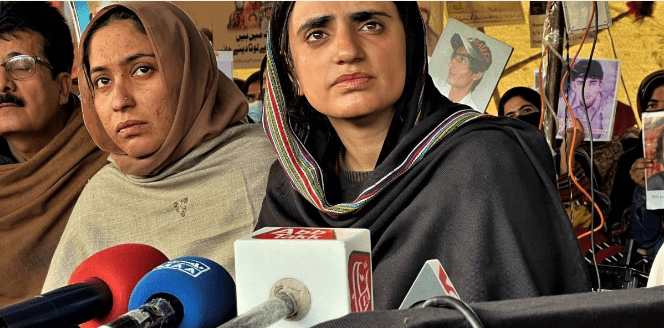
The Pakistan government has added the names of Baloch Yakjehti Committee (BYC) leaders, Dr. Mahrang Baloch and Sibagatullah Shah, to the Fourth Schedule list – a list of proscribed people under Pakistani anti-terror law.
In the first week of October, 2024, Mahrang, a political activist and leader of BYC, was prevented from attending a Time magazine event in New York. She was nominated in the Time100 Next list. The Wire had reported on the reasons behind the travel restrictions imposed on her.
Mahrang told The Wire that legally, a person is required to be informed of their inclusion in the Fourth Schedule list within three days. This allows the person to challenge the decision in court. However, Mahrang said that she only found out about her and Shah’s inclusion in it through social media.
“I was not allowed to travel on October 7 and after [challenging this in court], the government added my name [to the no-fly list] on October 18,” Mahrang said, adding that the state not only stopped her illegally, but also confiscated her passport and phone, which have still not been returned.
“The state does not want me to travel abroad, nor does it want me to move freely within the country,” she said.
‘Countless Balochs included in the anti-terrorism list’
The Pakistani government has been imposing restrictions on political activists in Balochistan and abducting political workers and students for years. More than 50 Baloch citizens were reportedly abducted this month alone.
In addition to this, through the Fourth Schedule, countless Baloch people from various walks of life have been included in the anti-terrorism list. Critics often point out that the Anti-Terrorism Act (ATA), promulgated on August 13, 1997 to prevent terrorism in Pakistan, is now being used to silence peaceful and democratic voices seeking justice in line with the constitution and international human rights.
Sibagatullah stated that Balochistan has endured state violence for a long time, yet such measures cannot deter the Baloch people from pursuing a peaceful movement. He pointed out that had Mahrang or he been guilty of any crime, the state would have notified them.
Shah argued that the state seeks to stifle Baloch people and their movement through such tactics, thereby revealing its own culpability. He said that the state targets the Baloch through killings, abductions, and draconian laws. “However, from its inception, the BYC has been a peaceful movement and will remain so, emphasising that such measures cannot extinguish their cause,” he added.
Disproportionate attention to Quetta
Imran Baloch, an advocate familiar with Fourth Schedule cases in Balochistan, said that senior politicians Dr. Malik Baloch and Akhtar Mengal Baloch have reported that over 3,000 names were added to the Fourth Schedule list this year. However, the Balochistan government claimed that only 311 people from Quetta city were added to the list. This implies that every city in the province has its own list; nevertheless, the government insisted that only people from Quetta were included, when in fact, people from Gwadar and Panjgur are also on the list, he said. “The state simply has a form to fill it out with the name of Baloch, yet, it does not understand what each person actually does,” Imran added.
Sibagatullah ridiculed the state, pointing out that the Anti-Terrorism Act form carries questions related to the Taliban, despite politics in Balochistan differing from that in Khyber Pakhtunkhwa, where this form was originally used. He criticised the state for its failure to update the questionnaire, saying that it shows a lack of understanding on their part and proves its intent to harass the Baloch.
When questioned about the role of political parties, Mahrang said that many political parties today are merely wings of the military establishment. She mentioned the recent 26th constitutional amendment, which has extinguished hopes for justice within the system.
The amendment has resulted in significant changes in the structure and functioning of Pakistan’s judicial system, particularly with respect to the Supreme Court and High Courts. Many believe that move ‘seriously undermines’ the independence of Pakistan judiciary.
Mahrang expressed her lack of faith in the judiciary, even though the BYC has approached the court to challenge the Fourth Schedule. However, she is resolute that no list can prevent her from meeting her people, nor strip the Baloch of their right to political activism.






